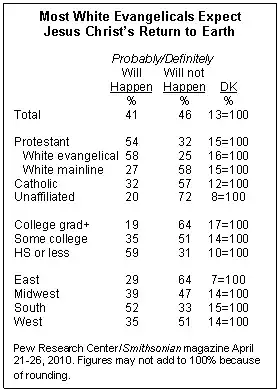Fully 79% of Christians in the U.S. say they believe that Jesus Christ will return to Earth someday. A 2006 survey by the Pew Research Center’s Forum on Religion & Public Life and the Pew Research Center for the People & the Press found less agreement among Christians, however, over the timing and circumstances of his return. One-in-five American Christians, 20%, believe the Second Coming will occur in their lifetime, a larger number than the 17% who do not believe in the Second Coming at all. (Pew Research Center 2009)
The entire full report does not mention climate change and / or global warming. I found a report that predicted this number for 2050 would be approximately 41% but this is not now, 2009 is the closest I could find to now.
The Christian Post provided some supportive evidence.
Nearly half of Americans now believe that the recent surge in natural
disasters is the result of biblical "End Times" than climate change,
and more than two-thirds of white evangelical Protestants hold this
belief, according to a new study. (The Christian Post, 2014)
The original research from for the Christian Post is from the PRRI (2014) and URL explains the methodology and process. I am unsure if PRRI is peer-reviewed. I would classify this as, treat-with-caution, as it is in the grey literature. The citation is
Jones, Robert P., Daniel Cox, and Juhem Navarro-Rivera. “Believers, Sympathizers, & Skeptics: Why Americans Are Conflicted about Climate Change, Environmental Policy, and Science.” PRRI. 2014.
When asked about these causes separately, Americans are more likely to
say that recent natural disasters are the result of climate change
(62%) than biblical “end times” (49%).
The number of Americans who believe natural disasters are evidence of
the apocalypse has increased since 2011, when only 44% agreed.
White evangelical Protestants are much more likely to attribute the
severity of recent natural disasters to the biblical “end times” (77%)
than to climate change (49%).
Most Americans do not believe that God would intercede to prevent
humans from destroying the earth. Approximately 4-in-10 (39%)
Americans believe that God would not allow humans to destroy the
earth, while a majority (53%) of Americans disagree.
You cannot ascertain if these 39% are Christian and if they are considering climate change as an earth destroying event. It likely is not earth-destroying according to the IPCC or any other source I can find.
Religion dispatches (2013), dispute the claims in general about the linkage between Christianity and climate change lack of concern, but this is a source that should be treated with a high-level of skepticism.
I think the question of if rapture, second-coming, or the end-of-times Christians care less about climate change and 40% do not care due to the upcoming rapture is conflated from the PRRI paper combined with the Pew quotes. I would state that the 40% statement is neither proven or unproven and that Norm Chomsky may be conflating the 40% part which appears to be true with the not-caring part which he is inferring but is not proven.
